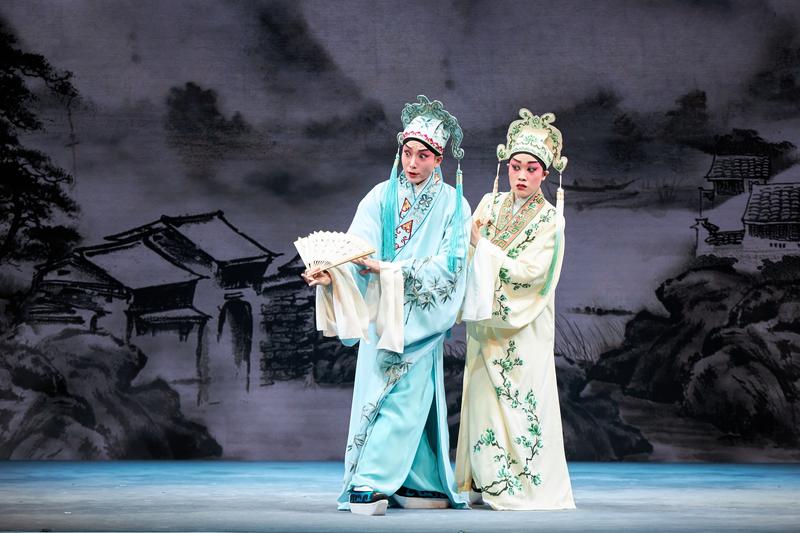 Chan Chak-lui as Liang Shanbo and Chan Hei-yu as Zhu Yingtai in a scene from The Butterfly Lovers. (PHOTO PROVIDED TO CHINA DAILY)
Chan Chak-lui as Liang Shanbo and Chan Hei-yu as Zhu Yingtai in a scene from The Butterfly Lovers. (PHOTO PROVIDED TO CHINA DAILY)
Tea House Theatre Experience produced by Xiqu Centre — probably the world’s only performance art venue dedicated exclusively to the staging of Cantonese opera — returns on July 9, minus the dim sum and tea. Targeted primarily at Cantonese opera virgins, the 90-minute variety show is designed to recreate the experience of sampling traditional forms of Cantonese theater and music over light refreshments in Hong Kong’s early 20th-century tea houses.
However, until such time as the local government green signals the lifting of COVID-19 related restrictions on Hong Kong theaters, there won’t be any tea and dim sum (it’s mandatory for the audience to wear surgical masks for the duration of the show). The seating, at 50 per cent of the theater’s capacity, in keeping with government regulations, has been re-designed to keep the audiences at a safe distance from one another.
There’s an enormous challenge involved in trying to revive what is essentially a collective community experience at the time of social distancing. A typical tea house theater show is about enjoying food, art and conversation with fellow patrons of the establishment. Community bonding is at the heart of such an experience — a feat that might be difficult to achieve when everyone, including the musicians playing on instruments that do not require them to use their mouths, are masked.
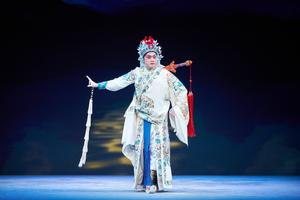 Alan Tam Wing-lun plays the title role in an excerpt from Han Xin Defects to Han from Chu as part of the Tea House Theatre Experience, staged at the newly-reopened Xiqu Centre. (PHOTO PROVIDED TO CHINA DAILY)
Alan Tam Wing-lun plays the title role in an excerpt from Han Xin Defects to Han from Chu as part of the Tea House Theatre Experience, staged at the newly-reopened Xiqu Centre. (PHOTO PROVIDED TO CHINA DAILY)
“Despite the widened seat rows and musicians separating to either side of the stage to maintain social distance, the theatrical experience and atmosphere are not compromised,” says Naomi Chung, producer of Tea House Theatre Experience. “Performers have a powerful command of the atmosphere in the room.”
A responsive audience can go a long way in making a great show a really good one. And this should be especially true for a small, intimate space such as the Tea House Theatre, where, in normal times, performers are probably able to read the expressions on the faces of every person in the room. Isn’t performing in a half-empty theater, to masked audiences, seated in ones and twos and as far away from their neighbors as possible, somewhat demoralizing for the actors?
Chung disagrees. “The performers can sense the mood and excitement from the audiences in a reasonably distanced setting. They can connect with each other,” she insists.
“All our shows have an expert moderator to help engage with the audiences and introduce them to the history of the Cantonese opera art form. The moderator plays a unique and important role, especially in the current environment, where they can assist performers to drive more interaction with the audiences,” she adds.
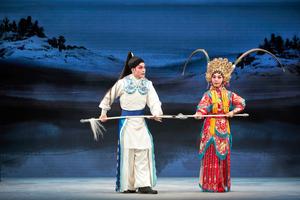 Mo Huamin as Prince of Northern Han and Chan Kei-ting as Song warrior Jinding in an excerpt from The White Dragon Pass. (PHOTO PROVIDED TO CHINA DAILY)
Mo Huamin as Prince of Northern Han and Chan Kei-ting as Song warrior Jinding in an excerpt from The White Dragon Pass. (PHOTO PROVIDED TO CHINA DAILY)
A touch of tradition
The fare on offer is reasonably delicious. Put together by Xiqu Centre’s curator and artistic director, Law Ka-ying, the show opens with a naamyam (narrative ballad song popular in the Pearl River Delta in the early 20th century) number. Written by Law himself, the song is a brief introduction to Xiqu Centre and its Tea House Theatre.
What follows is a medley of well-loved scenes from representative Chinese opera, dovetailed with instrumental music, and a rarely-performed robust song-and-dance routine from a Cantonese opera in which the song is sung in archaic Mandarin.
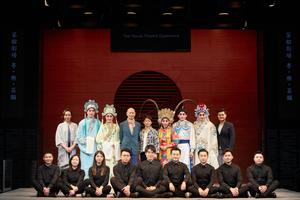 Tea House Rising Stars Troupe's artistic curator and director Law Ka-ying and producer Naomi Chung with performers of Tea House Theatre Experience. (PHOTO PROVIDED TO CHINA DAILY)
Tea House Rising Stars Troupe's artistic curator and director Law Ka-ying and producer Naomi Chung with performers of Tea House Theatre Experience. (PHOTO PROVIDED TO CHINA DAILY)
Some of the pieces presented as part of the experience come across as highly-relatable, despite Cantonese opera being a very stylized, traditional form of theater, played wearing elaborate costume and headgear and pan-cake make-up. For instance, in the scene from The Butterfly Lovers, Zhu Yingtai — a woman disguised as a man who is attracted to fellow scholar Liang Shanbo — tries conveying her feelings to him in a number of ways and cannot imagine why he still fails to get it. Zhu takes the lead in the relationship, helping the more delicate and bookish Liang to cross the river and get past a barking dog.
Law Ka-ying, artistic curator and director, Tea House Rising Stars Troupe, says Zhu was already a strong, determined woman in the original story. The character did not require any tweaking to resonate with a contemporary audience.
“We focus more on preserving the traditional elements because the beauty of the art of Cantonese opera lies in its traditions.” says Law, who is not considering doing experimental productions based on a traditional form just yet. “In the Tea House Theatre, we specifically preserve the authentic atmosphere of Hong Kong’s Cantonese opera performances, allowing audiences to experience and learn about this heritage art form.”
Evidently, the focus is on drawing attention to a national heritage that performance art aficionados often assume to be too arcane and esoteric.
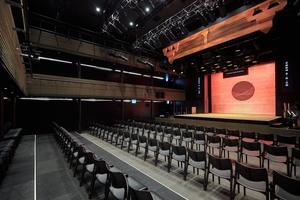 The Tea House Theatre in Xiqu Centre is operating at 50 per cent capacity. The tea and dim sum experience during the show is temporarily on hold. (PHOTO PROVIDED TO CHINA DAILY)
The Tea House Theatre in Xiqu Centre is operating at 50 per cent capacity. The tea and dim sum experience during the show is temporarily on hold. (PHOTO PROVIDED TO CHINA DAILY)
The high-energy performances by a talented bunch of young performers, interspersed with lively, and lilting, music played on not-too-common Chinese music instruments such as suona (double-reeded horn) and sheng (Chinese reed pipes), is a colorful romp through local cultural heritage — immensely enjoyable even without the dim sum.
If you go
Tea House Theatre Experience
Directed by Law Ka-ying
Date: From July 9 to 31
Venue: Tea House Theatre, Xiqu Centre, 88 Austin Road West, Tsim Sha Tsui


